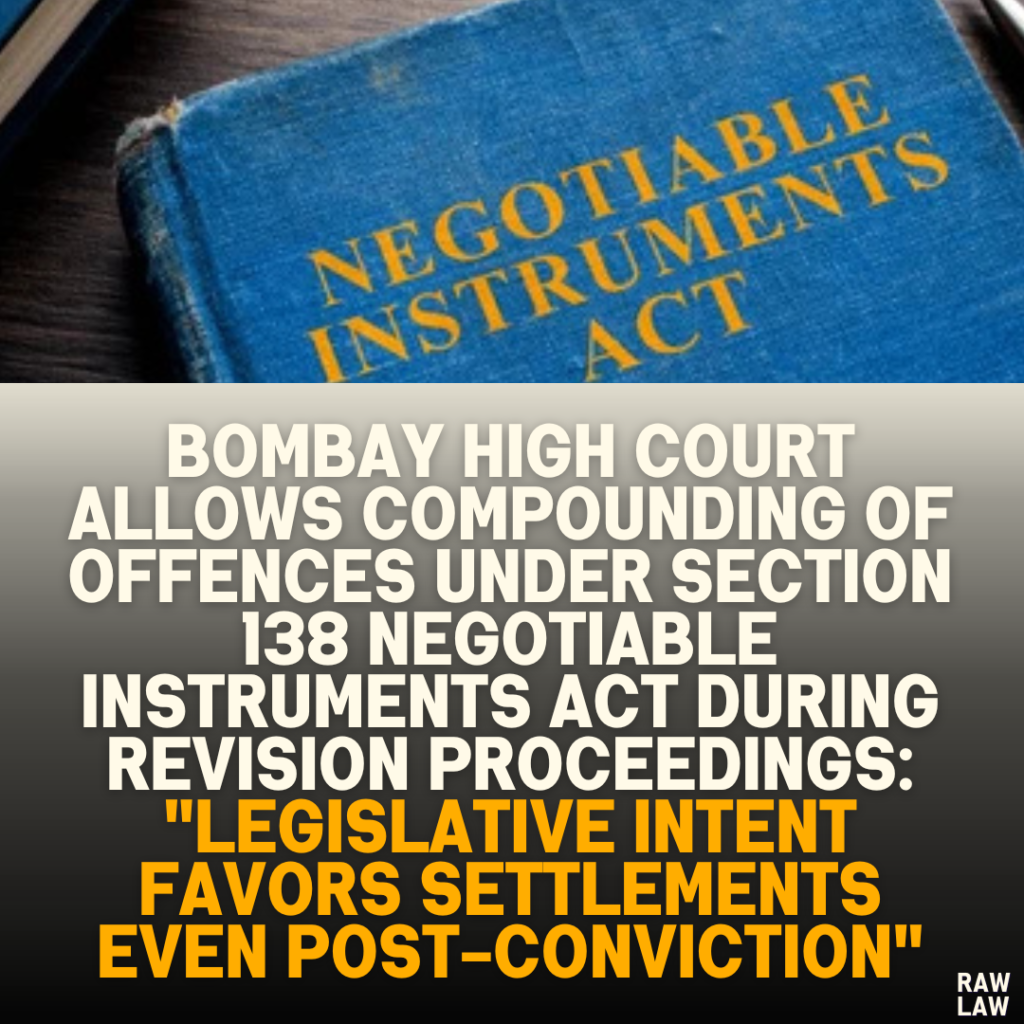Court’s Decision
The Bombay High Court addressed a pivotal question: whether it could accept consent terms in revision proceedings under Section 397 of the Code of Criminal Procedure (Cr.P.C.) for cases involving offences under Section 138 of the Negotiable Instruments Act (N.I. Act). It concluded affirmatively, emphasizing that the legislative intent behind Section 147 of the N.I. Act permits compounding at any stage, including the revision stage, even after conviction. The court observed:
“Justice must not only be done but also be seen to be done, and a settlement provides a pragmatic resolution to disputes.”
Facts
- The criminal revision applications arose out of convictions under Section 138 of the N.I. Act (cheque dishonour cases).
- The applicants had been convicted by trial courts, and the convictions were upheld in appellate proceedings.
- During the pendency of revision applications before the High Court, the parties entered into settlements and submitted consent terms.
- The applicants sought compounding of offences and quashing of their convictions based on the settlement terms.
Issues
- Primary Legal Question:
Whether a High Court exercising revisional jurisdiction under Section 397 Cr.P.C. can accept consent terms and compound offences under Section 138 of the N.I. Act, post-conviction. - Secondary Consideration:
What procedural safeguards and conditions should guide such compounding?
Petitioner’s Arguments
- Statutory Authority for Compounding:
The petitioners contended that Section 147 of the N.I. Act expressly allows compounding of offences at any stage, including during revisional proceedings. - Settlement as the Core Objective:
The purpose of Section 138 of the N.I. Act is primarily compensatory, focusing on ensuring financial rectitude rather than punitive measures. Accepting the consent terms aligns with the legislative intent to prioritize settlements. - Efficiency in Judicial Process:
Refusing to accept consent terms prolongs litigation unnecessarily, overburdening courts and detracting from the interests of justice. - Harmonious Reading of Provisions:
They argued for a harmonious reading of Section 397 Cr.P.C. with Section 147 of the N.I. Act to uphold the broader goal of facilitating dispute resolution.
Respondent’s Arguments
- Judicial Scrutiny at a Late Stage:
The respondents argued that compounding at an advanced stage of litigation, post-conviction, must be scrutinized rigorously to avoid undermining the judicial process. - Public Policy Considerations:
They emphasized that while cheque dishonour offences are between private parties, they impact the credibility of financial instruments, which has a larger societal dimension. - Balance Between Justice and Procedure:
The court must ensure that accepting settlements does not dilute the procedural safeguards or allow abuse of the legal system.
Analysis of the Law
The court examined the relevant legal provisions and their interplay:
- Section 147, N.I. Act:
- This section begins with a non-obstante clause, explicitly overriding conflicting provisions of the Cr.P.C.
- It declares all offences under the N.I. Act as compoundable, thereby prioritizing settlement over punishment in financial disputes.
- Section 397 and 401, Cr.P.C.:
- These sections provide for revisional jurisdiction, allowing High Courts to correct legal irregularities or gross miscarriages of justice.
- The powers under Section 401 Cr.P.C. include those of an appellate court, enabling the High Court to modify or annul findings where warranted.
- Inherent Powers of the High Court (Section 482, Cr.P.C.):
- These powers allow the court to pass orders to secure the ends of justice and prevent abuse of process.
- The inherent powers reinforce the court’s discretion to accept settlements and compound offences, even in revisional proceedings.
Precedent Analysis
The court referred to significant precedents to substantiate its reasoning:
- Meters and Instruments Pvt. Ltd. v. Kanchan Mehta
- The Supreme Court held that even without the complainant’s consent, offences under Section 138 N.I. Act could be compounded if compensation had been paid.
- Damodar S. Prabhu v. Sayed Babalal H.
- This judgment emphasized the compensatory nature of Section 138 cases, encouraging settlements at all stages.
- In Re: Expeditious Trial of Cases Under Section 138 of the N.I. Act
- The court clarified procedural requirements for compounding but reaffirmed its permissibility at later stages, including post-conviction.
- Abasaheb Yadav Honmane v. State of Maharashtra
- The Full Bench of the Bombay High Court outlined the limits of revisional jurisdiction while allowing the court to pass orders furthering justice.
Court’s Reasoning
- Legislative Intent:
The non-obstante clause in Section 147 of the N.I. Act reflects a clear legislative preference for compounding over prolonged litigation. - Revisional Jurisdiction:
The High Court’s power under Sections 397 and 401 Cr.P.C. extends to ensuring that cases do not unnecessarily burden the judicial system. Settlements must be respected when they serve the interests of justice. - Balancing Interests:
While promoting settlements, the court emphasized the need to deter delays that burden judicial resources. It highlighted the importance of awarding costs or penalties in belated settlements to preserve judicial discipline.
Conclusion
The Bombay High Court held that it has the jurisdiction to accept consent terms and compound offences under Section 138 of the N.I. Act during revision proceedings under Section 397 Cr.P.C. The court remarked:
“The compensatory nature of Section 138 proceedings mandates that settlements be given priority, provided they meet the ends of justice.”
Implications
This decision is significant as it:
- Encourages amicable settlements in financial disputes.
- Reinforces the judiciary’s role in promoting efficiency and reducing litigation backlog.
- Balances the rights of the accused and complainant while safeguarding procedural integrity.
- Sets a precedent for accepting settlements in advanced litigation stages, emphasizing justice over technicalities.
